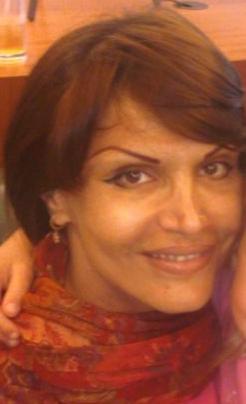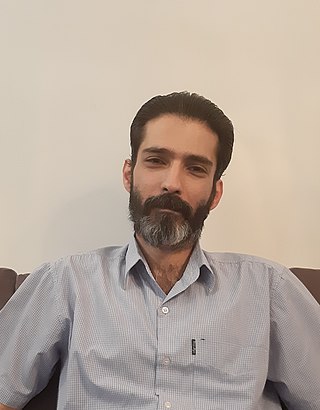Evin may refer to:

Zahra "Ziba" Kazemi-Ahmadabadi was an Iranian-Canadian freelance photojournalist. She gained notoriety for her arrest in Iran and the circumstances in which she was held by Iranian authorities, in whose custody she was killed. Kazemi's autopsy report revealed that she had been raped and tortured by Iranian officials while she was at Evin Prison, located within the capital city of Tehran.

Evin Prison is a prison located in the Evin neighborhood of Tehran, Iran. The prison has been the primary site for the housing of Iran's political prisoners since 1972, before and after the Islamic Revolution, in a purpose-built wing nicknamed "Evin University" due to the number of students and intellectuals housed there. Evin Prison has been accused of committing "serious human rights abuses" against its political dissidents and critics of the government.

Abdollah Noori is an Iranian cleric and reformist politician. Despite his "long history of service to the Islamic Republic," he became the most senior Islamic politician to be sentenced to prison since the Iranian Revolution, when he was sentenced to five years in prison for political and religious dissent in 1999. He has been called the "bête noire" of Islamic conservatives in Iran.

Sayyid Assadollah Ladjevardi was an Iranian conservative politician, prosecutor and warden. He was one of the officials responsible for the 1988 executions of Iranian political prisoners, and was assassinated by the People's Mujahedin of Iran on 23 August 1998.

Evin is a neighbourhood in the north of Tehran.

Abdolfattah Soltani is an Iranian human rights lawyer and spokesman for the Defenders of Human Rights Center. He co-founded the group with Mohammad Seifzadeh and Nobel Peace Prize-winner Shirin Ebadi. Along with Ebadi, Soltani served as a lawyer for the family of slain Iranian-Canadian photojournalist Zahra Kazemi, who was allegedly tortured and murdered in Evin Prison in July 2003. Ebadi and Soltani, along with others, also represented jailed journalist Akbar Ganji during his imprisonment and long hunger strike. Soltani, who won the Nuremberg International Human Rights Award, in 2009, served time in prison in 2005 and 2009, and was sentenced to 18-year prison sentence in 2012.

Ahmad Batebi is an Iranian activist who was designated a prisoner of conscience by Amnesty International. During his studies at the University of Tehran he gained international fame for his appearance on the July 17, 1999, cover of The Economist magazine, holding up a shirt splattered with the blood of a fellow protester.
Haleh Esfandiari is an Iranian-American academic and former Director of the Middle East Program at the Woodrow Wilson International Center for Scholars in Washington, D.C. Her areas of expertise include Middle Eastern women's issues, contemporary Iranian intellectual currents and politics, and democratic developments in the Middle East. She was detained in solitary confinement at Evin Prison in Tehran, Iran for more than 110 days from May 8 to August 21, 2007.

Mitra Farahani is an Iranian filmmaker and painter who currently lives in Paris.
Do Ab or Dow Ab or Du Ab or Doab or Dowab or Duab, meaning "two rivers", may refer to:

Zahra Bahrami, also spelled Sahra Baahrami, was a dual Dutch and Iranian citizen who was executed in Iran after being arrested during a political protest, and later convicted by the Islamic Revolutionary Court for drug trafficking. She was initially arrested in December 2009 for participating in the Ashura protests and charged with national security offenses as well as for being a member of Kingdom Assembly of Iran. However, according to the Iranian Judicatory, a subsequent search of her house uncovered 450 grams of cocaine, 420 grams of opium, and several forged passports. Subsequently, the Tehran prosecutors charged her with drug trafficking and being a member of an international drug-trafficking network, for which she received a death sentence.

Masoud Lavasani, is an Iranian journalist and blogger. Lavasani was the culture editor of the newspaper Aftab-e-Yazd in Tehran and has also worked for Shargh, Hamshahri and Etemad as well as the Mehr News agency.

Seyyed Sattar Beheshti was an Iranian blogger who died under suspicious and unclear circumstances in early November 2012 several days after being arrested by the Iranian Cyber Police unit for criticizing the government of the Islamic Republic on Facebook, and after making a signed complaint of being tortured while in custody. His reported death has drawn international condemnation and led to the dismissal of the commander of Iran's cybercrimes police unit.
Maryam Shafipour is an Iranian human rights activist. Following seven months of pre-trial detention in Evin Prison, including more than two months in solitary confinement, Shafipour was sentenced in March 2014 to seven years in prison for her political activities. Human rights organization have called for her release and condemned her conviction and prison sentence. She was released in July 2015.

Mohammad Hossein Rafiee Fanood is an Iranian scholar, pro-democracy activist, and an author. He is a retired professor of polymer chemistry at University of Tehran, and a member of Meli-Mazhabi (National-Religious) Alliance and Iran's National Peace Council. The Iranian regime arrested him in 2015 for his political views.
Marjan Davari is an Iranian researcher, translator and writer who has been studying, teaching, translating and researching philosophical texts for more than 20 years.
Golrokh Ebrahimi Iraee or Golrokh Iraee is an Iranian writer, accountant, political prisoner and a human rights defender who advocates against the practice of stoning in Iran. As a religious prisoner of conscience she was represented by Vice Chair of the USCIRF Gayle Manchin.

Amirsalar Davoudi is an Iranian human rights lawyer born on 21 June 1981. He was sentenced to 30 years in prison and 111 lashes for his human rights work.
Yasaman Aryani is an Iranian political prisoner. She appeared without a head scarf, and talked about it on social media.
On 15 October 2022, starting around 10:00 local time, a series of incidents including a fire, explosions and automatic gun battles occurred in the Evin Prison in Tehran, Iran, continuing through to early morning 16 October 2022. At least eight inmates died, and 57 others were injured according to Iranian government sources. An IRIB reporter stated that 40 people had died and then corrected herself.